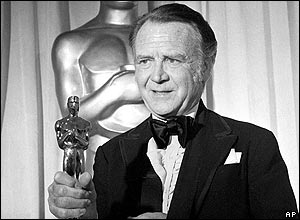"Love Story" had the most acting nominations (3) of any film in 1970. One of these, John Marley, had a small role in this film, but was so essential to the emotional arc of the story, and so beautifully played, that the Academy could not ignore him. (Two years later, Marley would wake up to a nasty surprise in "The Godfather"s most notorious scene.) Marley is Phil Cavalleri, a modest Italian baker and loving father to Radcliffe co-ed Jennifer (Ali McGraw). Has there ever been a more loving and agreeable dad in the history of movies? Indulgent to a fault, and willing to do anything for his daughter, he drops the formality of their relationship, and allows Jennifer to call him by his first name. He accepts her relationship with Oliver (Ryan O'Neal), and tries his best to understand all of its modern permutations. Marley is especially effective in a controversial scene in which Oliver and Jennifer inform Phil, a devout Catholic, that they don't believe in God and that they will not be married in a church. Without histrionics, Marley registers unshakable disappointment, then resignation and even support. I held my breath the whole time. "Love Story" tells of a marriage doomed by Jennifer's untimely death. It wasn't the deathbed scene as much as Marley's regret that he "promised to be strong" that got millions of tear ducts flowing in theaters the world over.
Director Arthur Penn continued his string of successful social comment, after "Bonnie and Clyde" and "Alice's Restaurant", with "Little Big Man", a tall tale told by Jack Crabb, a 125-year-old survivor of Custer's Last Stand (Dustin Hoffman in great makeup and Dorothy Michaels' phrasing). Among the cast was an elderly Native American actor with authentic presence and an amusing deadpan delivery named Chief Dan George, who was himself an author, poet, and chief of a tribe in Vancouver. He played Old Lodge Skins, the kindly leader of a Cheyenne tribal village, who takes in the young Crabb and becomes his "grandfather". Chief Dan George mesmerized audiences with his unique brand of wisdom and subtle humor, and was a shoo-in for a nomination; many thought that he would be a favorite to win. "Little Big Man" is a big, episodic, humorous epic that successfully, I think, tells an honest story of the Native American experience and fight for independence. Penn gave play to the exaggerations and pomposity of his narrator, but did an admirable job offering a more sympathetic portrayal of Native Americans than had been attempted before. The renewed interest in battles like Little Big Horn may have been a result of American involvement in Vietnam. By masking the horrors of Southeast Asia in tales of the American West, Hollywood, which was not prepared to deal with these events directly, could allude to tragedies like the My Lai massacre. Young people who were attuned to mind-altering experiences turned to Native American mysticism and fashion (and drugs). In this atmosphere, a film like "Little Big Man" was very successful. The appearance of Chief Dan George, with his wonderful portrayal, gave the film the credibility to be taken seriously.
John Mills' victory for his portrayal of Michael, the unfortunate brain-damaged mute inhabiting a WWI Irish coastal town in "Ryan's Daughter", was somewhat of a surprise. Other nominees had more critical support in high-profile, even leading, roles. And David Lean's film, although admired for its brilliant photography and technical achievement, was not a critical success. In retrospect, however, Mills' win makes sense. He was a long-time film veteran, appearing in scores of British and American productions; Hayley Mills, his daughter, was an extremely popular child-actor in the 1960's; and Oscar had a penchant for rewarding mute and disabled characters (Jane Wyman for "Johnny Belinda" in 1948, and later Marlee Matlin for "Children of a Lesser God" (1986), Daniel Day-Lewis for "My Left Foot" (1989) Holly Hunter for "The Piano" (1993) come to mind). This was also a departure for Mills, who played against type and was nearly unrecognizable as the "village idiot", whose simple love for the newlywed schoolteacher (Sarah Miles) proved the catalyst for her downfall and the town's political upheaval. Mills effectively used his entire body to suggest a misshapen misfit, and even under heavy makeup, drooling and with a perpetual grin, he communicated enormous longing with his eyes, and conveyed the innocence of a prince trapped inside a broken body. It is the showiest performance of all 20 acting nominees in 1970. Mills had the respect of his fellows in the Academy, and they recognized the gruelling physicality and level of difficulty he endured to pull the role off. Even though my personal preference would be for Richard Castellano, Mills created an unforgettable character, and the award here was well-deserved.






Nice piece! I haven't seen any of these all the way through.
ReplyDeleteThe only one of these I've seen is Castellano's performance. Frequently I've used the line, "So, what's the story?" with my friends and family, hoping they'll catch it. Few people do. A winning performance in an underappreciated movie.
ReplyDeleteJust watched Little Big Man on TCM. Great! I didn't expect such an amusing and moving film, a movie that I see as a precursor to Forrest Gump and Benjamin Button. Chief Dan George was great, a presence that could easily be taken for granted (and thank goodness it wasn't!). Thanks for the recommendation, Tom; you led me to a new experience, one I especially appreciated!
ReplyDeleteThank you for the comments, guys. I love that we have this way to communicate about shared interests!
ReplyDeleteWalter, your second comment is especially meaningful. I write about my beloved old movies as a hobby, and as a way to record my long-standing views. I always hoped that someone would be inspired to check out an old favorite based on one of my pieces. Your support and comments make my efforts worthwhile.
Thank you...